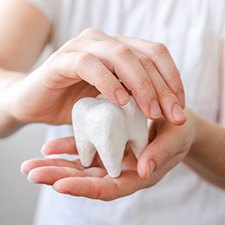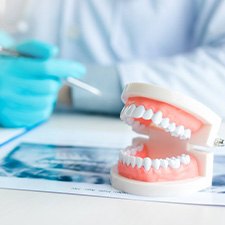
Dentures – Allen, TX
Seamlessly Replace Any Number of Missing Teeth
Even if you take diligent care of your teeth, sometimes they can still fall out despite your best efforts. Every single tooth is crucial to your oral health and your ability to perform simple everyday tasks like talking and eating. And, it goes without saying that having gaps in your grin can damage your self-esteem. Fortunately, Dr. Lewis can create dentures in Allen to seamlessly replace any number of missing teeth.

Why Choose Allen Smile Design for Dentures?
- Tooth- and Gum-Colored Materials Provided
- State-of-the-Art Technology in Modern Dental Office
- Works with Dental Implant Specialists
Who’s a Good Candidate for Dentures?

Dentures are a minimally invasive tooth replacement option, making them great for most patients with good oral health.
That said, we like to be thorough! To make sure oral complications won’t interfere with your new dentures, we’ll examine your oral health and review your medical history during your initial consultation. If we see signs of a condition like tooth decay or gum disease, we’ll help you take care of the issue so you can receive your dentures without worries.
Effects of Missing Teeth

Missing teeth can cause more complex problems than you might expect. Some patients feel insecure about their smile and hesitate to show their teeth in pictures and other social situations. Your physical wellbeing can be affected, too. Without some sort of dental replacement, your jawbone will likely shrink at an accelerated rate, and any remaining teeth could start to shift out of place.
Dentures can help prevent these issues, which is why we recommend scheduling a restorative appointment sooner than later!
What Qualifies You for Dentures?

You don’t have to be missing all of your teeth to be eligible for dentures; just one or more smile gaps and the ability to support an oral appliance on your gums. Nowadays they’re an extremely versatile replacement option, so we can custom-fit them to meet your needs.
Even if you’re unsure whether you can successfully support dentures, go ahead and give us a call. You might be surprised with what we can do to help even out the odds!
Alternative Tooth-Replacement Options

If dentures aren’t right for you, or you’re interested in other ways you can replace your smile gaps, Dr. Lewis would be happy to talk with you about alternatives. For example:
- Dental bridges are excellent for replacing teeth that are missing in a consecutive row. We’ll place a crown on a supporting tooth on either side of the gap and fill the space with a seamless set of false pearly whites.
Dental implants are just as versatile as dentures, but with maximum stability and comfort. If you’re willing to make the investment, their unique design can help you chew more effectively, enjoy more foods, and take care of your smile more easily.
Why Do I Need to Replace My Missing Teeth?

The more teeth you’ve lost, the more it impairs your oral and general health. When a tooth is gone, its root no longer stimulates your jawbone through biting and chewing. The jawbone then starts to deteriorate, resulting in the rest of your natural teeth losing support. Over time, they can loosen or even fall out.
It’s also hard to maintain a balanced diet when you’re missing teeth. Not being able to chew crunchy fruits and vegetables or tough meats can cause nutritional deficiencies that negatively impact your overall health. Your facial structures will also lose support, making you look older because of premature drooping and wrinkling of your skin.
Types of Dentures

Depending on how many teeth you’ve lost, your dentist in Allen may recommend one of the following:
Full Dentures
A full denture replaces an entire arch of missing teeth. An acrylic base holds a row of realistic ceramic teeth and snugly fits against your gums with natural suction.
Partial Dentures
If you still have some teeth left, we can complete your smile with a partial denture. We capture impressions of your mouth to craft replacement teeth that perfectly resemble your natural ones. The prosthetic teeth are attached to a metal framework that clasps into place behind your remaining teeth.
Implant-Retained Dentures
For a sturdier, longer-lasting solution, a full or partial denture can be secured with dental implants. Once these titanium posts have been placed in your jawbone, they prevent your denture from slipping at awkward times. They also stimulate the jawbone to prevent it from breaking down.
The Benefits of Dentures

Dentures have been assisting patients with missing teeth for quite some time, and for good reasons—modern dentures are comfortable to wear, look just like natural teeth, and grant a patient all the benefits of a complete smile. Better yet, they come with all kinds of other unique and life-improving benefits. Here’s a closer look at just a few:
Psychological Benefits

While missing teeth causes all kinds of physical issues with eating and speaking, the psychological toll it can also take can be quite steep. Studies show that those who experience tooth loss also often deal with increased social anxiety, sadness, depression, and other mental health problems. This means that by replacing your missing teeth with dentures, you’re also bolstering your mental fortitude and setting yourself up to smile confidently and happily for life.
Clearer Enunciation

Without all of your teeth, you might also find speaking clearly difficult, which can lead to you feeling reluctant to talk and socialize with others. Dentures can replace any number of missing teeth, no matter where they’re located—including the front ones that play an important part in enunciation. Once you’ve become accustomed to wearing your dentures, you’ll find yourself speaking just as clearly as you used to.
Improves Nutrition

Simply put, our teeth are the absolute best tools at our disposal for biting, chewing, and eating foods, and if you aren’t without all of your pearly whites, some foods might not be edible at all! Dentures fix this, restoring your ability to bite and chew most foods and allowing you to expand your diet and benefit from more nutritional foods. Just be sure to rinse your dentures off after eating, to keep them clean and fresh!
Preserves Oral Health

Tooth loss is such a huge problem because in many cases, what begins as one or two missing teeth can trigger a chain reaction that leads to several more falling out. Plus, when you have missing teeth, it means that any remaining teeth are placed under more strain, which in turn can cause wear like chips and cracks. Dentures don’t just fill out the gaps in your smile; they also reduce the pressure placed on your existing natural teeth, helping them to stay healthy. Dentures can also provide your jaw with some of the stimulation that is lost when teeth are gone.
Expands Opportunities

Most people agree that someone’s smile is the first feature they notice when they see or greet them—and since dentures look so natural, they can lead to more enjoyable, memorable, and productive meetings and interactions. This can have a huge impact in the professional world, as well as when it comes to personal connections.
Dentures Aftercare

Once you have your brand-new dentures for a complete smile, you’ll want to keep several things in mind to maintain your new pearly whites. Without proper care, they can end up becoming damaged, warped, or ill-fitted, which can affect your oral health in the long run. Fortunately, our team can provide you with helpful aftercare guidelines so that you can make the most of your prosthetics.
Remove After Eating

Every time you finish eating, it’s always best to rinse and clean your dentures thoroughly. You’ll want to keep your prosthetics clear of food particles, plaque, and other debris that can increase the chances of developing infections and/or gum disease. When cleaning, avoid using hot water, as this can cause your dentures to fit improperly and/or uncomfortably.
Clean Your Prosthetics

You’ll need to remove your dentures entirely before cleaning them. This is so that you can get all of the surfaces of your prosthetics, especially the side that touches the gums. Use a soft-bristled toothbrush and minimal hand soap. Don’t use regular toothpaste, which can sometimes be abrasive. You can also use denture cleanser to scrub your prosthetics with, and remember to soak them in cleansing solution or water to keep them from drying out or losing shape. Rinse them well before wearing them again.
Keep Your Dentures Safe

When handling your dentures, be sure to use caution to avoid damaging or breaking them. That’s why you should place a towel underneath them while cleaning, as this can cushion their fall in case you accidentally drop them. Remember to also place your dentures in a safe spot away from curious children and pets.
Remove Dentures When You Sleep

Before going to sleep, always remember to remove your dentures. While you might keep them on for the very first 24 hours after receiving new ones, it’s important not to wear them at night after that. Leaving them on while you rest can end up causing problems like gum irritation or restricted blood circulation. Instead, you’ll need to take them out to allow your gums to get their necessary nutrients. Placing your dentures in a glass of water or cleansing solution also helps prevent them from getting dry or losing their shape.
Notice Changes

Once you’ve started wearing your prosthetics more often, keep an eye out for any abnormalities or changes in either your mouth or your new teeth. If there are any issues with them, notify your dentist right away for help. Our team will be able to readjust or even replace your dentures so that you can maintain your renewed bite. Never try fixing your prosthetics by yourself, as you could end up accidentally making matters worse. Contact our staff so that we can help fix the problem!
Start Rebuilding Your Smile Today!
If you’re ready to enjoy the benefits of having a full, natural-looking smile, it’s time to discuss whether dentures would be right for you. Contact Allen Smile Design today to schedule your consultation.